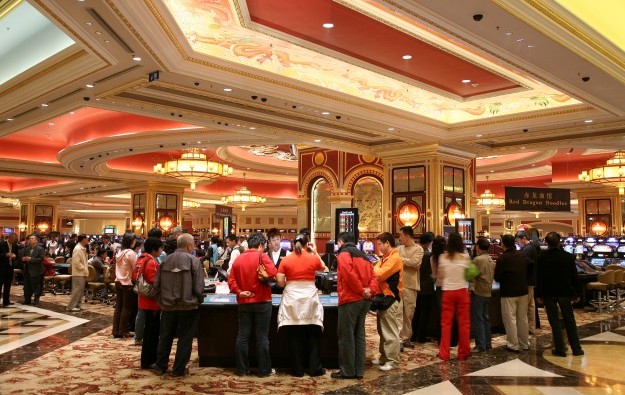Macau mass gaming margins not so robust: DB
Oct 07, 2015 Newsdesk Latest News, Macau, Top of the deck

The idea that Macau mass-market gambling is an inherently high-margin business – that will come to the rescue of the city’s casinos as the lower-margin, traditionally high-volume VIP segment declines – doesn’t stand close scrutiny, suggests a note from Deutsche Bank Securities Inc.
“The mass gaming segment has anywhere from a 20 to 30 percentage point margin profile advantage relative to VIP. However, a meaningful pick up in mass revenue, as a percentage of the mix, has not led to improving [property] margins,” said Tuesday’s note from analysts Carlo Santarelli and Danny Valoy.
The bank said mass revenue had gone from an average of 36 percent of Macau’s casino gross gaming revenue (GGR) during the period from the third quarter 2013 to the second quarter 2014; rising to 44 percent in the period from the third quarter 2014 to the second quarter 2015.
“During this period, our comp set [competitive set] property EBITDA [earnings before interest, taxation, depreciation and amortisation], as a percentage of GGR has actually declined 10 basis points. This trend has actually accelerated to the downside in recent quarters,” added the Deutsche Bank team.
Official data showed that mass revenue accounted for 44.5 percent of casino GGR in the second quarter of 2015, up from 41.8 percent in the previous quarter and from 39.9 percent in the prior-year period.
Deutsche Bank offered a number of reasons for the lack of a positive correlation between a rise in mass gambling revenue – as a proportion of all Macau GGR – and property EBITDA. It said some were “understandable”, while others were “a bit more ominous”.
“On reduced play levels, labour wage increases [commencing] in the second half 2014 have elevated what are essentially fixed costs in Macau,” noted the analysts.
In Macau, the government has a policy of reserving casino dealer jobs for Macau identity card holders. On May 1 this year, several local labour groups representing casino workers held rallies in Macau calling for higher salaries and demanding tighter restrictions on imported labour in the gaming sector.
Morgan Stanley group said in a report on September 15 that it estimated Macau operators’ staff costs to be the biggest portion of controllable costs – representing 60 percent to 70 percent of total operating costs excluding tax and junket commissions. It noted that “inability to cut local staff, …5 percent per annum [salary] increment and two months bonus per annum have made… cost cutting… a lot more difficult than [in] many other industries”.
Competitive pressure
Deutsche Bank stated in its Tuesday note that hotel and retail operations in Macau – historically high-margin segments – had been negatively affected by the VIP downturn, and by implication, also by China’s economic slowdown.
Lower occupancy rates in hotels had led to lower room rates. Reduced VIP and junket room business had led to reduced spending in the retail segment, and a lower contribution to the resort operators from shop rents, some of which are linked to shop turnover, the institution added.
“Given increasing competition from new openings and from historically VIP-centric operators trading into the mass segment, we find it difficult to underwrite the belief that mass segment margins have held firm,” stated Mr Santarelli and Mr Valoy.
There is a cluster of new casino resorts opening in Macau’s Cotai district between now and 2017. The next to open is the US$3.2-billion Studio City, majority owned by Melco Crown Entertainment Ltd, and due to launch on October 27.
Brokerage Sanford C. Bernstein Ltd in Hong Kong said in a note on Tuesday that it was important to see what fresh public policy support – if any – would emerge for the Macau casino industry following recent comments by Li Gang, director of the Central People’s Government Liaison Office in Macau, and by senior members of the Macau government.
“Potential policy support from the central government may surprise on the upside, but the details will be critical to understand as previous government statements have not always resulted in any positive impact on gaming revenues or visitation,” noted Sanford Bernstein analysts Vitaly Umansky, Simon Zhang and Bo Wen.
A recent note from Deutsche Bank AG analyst Karen Tang in Hong Kong, suggested one possible support measure would be for Macau to relax the cap on the number of live gaming tables allowed in the market.
Related articles
-
 Melco to get 50pct casino EBITDA at Sri...
Melco to get 50pct casino EBITDA at Sri...Jul 10, 2024
-
 Some players avoiding Macau amid cash...
Some players avoiding Macau amid cash...Jul 02, 2024
More news
-
 Donaco EBITDA up y-o-y to above US$4mln...
Donaco EBITDA up y-o-y to above US$4mln...Jul 26, 2024
-
 HK listed Palasino upgrades Czech...
HK listed Palasino upgrades Czech...Jul 26, 2024
Latest News
Jul 26, 2024
Border-casino operator Donaco International Ltd has achieved a 164.17-percent year-on-year increase in its latest quarterly group earnings before interest, taxation, depreciation and amortisation...Sign up to our FREE Newsletter
 (Click here for more)
(Click here for more)
Pick of the Day
”We’ve got more traction outside of Macau at the moment. But Macau’s going be a bigger focus for us”
David Punter
Regional representative at Konami Australia
Most Popular
 Sheraton brand to exit Londoner Macao, to be Londoner Grand July 25, 2024
Sheraton brand to exit Londoner Macao, to be Londoner Grand July 25, 2024  Macau regulator probes unlicensed gaming agents July 24, 2024
Macau regulator probes unlicensed gaming agents July 24, 2024  Philippines gives 20k aliens in POGOs 60 days to leave July 25, 2024
Philippines gives 20k aliens in POGOs 60 days to leave July 25, 2024  Philippines-listed DigiPlus says not affected by POGO ban July 24, 2024
Philippines-listed DigiPlus says not affected by POGO ban July 24, 2024  Sands China 2Q EBITDA down q-o-q amid low hold, renovation July 25, 2024
Sands China 2Q EBITDA down q-o-q amid low hold, renovation July 25, 2024






